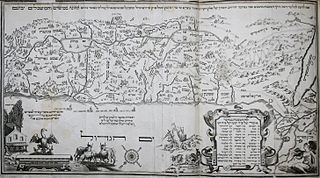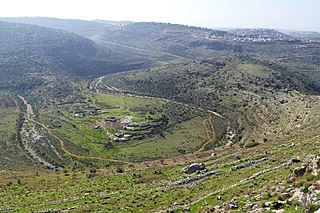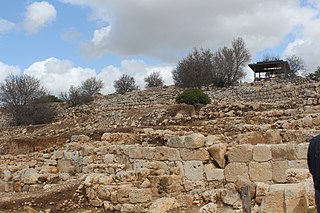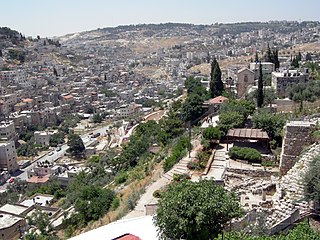Related Research Articles

The Kingdom of Israel, also called the Northern Kingdom or the Kingdom of Samaria, was an Israelite kingdom that existed in the Southern Levant during the Iron Age. Its beginnings date back to the first half of the 10th century BCE. It controlled the areas of Samaria, Galilee and parts of Transjordan; the former two regions underwent a period in which a large number of new settlements were established shortly after the kingdom came into existence. It had four capital cities in succession: Shiloh, Shechem, Tirzah, and the city of Samaria. In the 9th century BCE, it was ruled by the Omride dynasty, whose political centre was the city of Samaria.

According to the Hebrew Bible, the Tribe of Ephraim was one of the tribes of Israel. The Tribe of Manasseh together with Ephraim formed the House of Joseph. It is one of the ten lost tribes. The etymology of the name is disputed.

According to the Hebrew Bible, the Tribe of Manasseh was one of the twelve tribes of Israel. After the catastrophic Assyrian invasion of 720 BCE, it is counted as one of the ten lost tribes. Together with the Tribe of Ephraim, Manasseh also formed the House of Joseph.

Penuel is a place described in the Hebrew Bible as being not far from Succoth, on the east of the Jordan River and south of the river Jabbok in present-day Jordan.

Mount Ephraim, or alternatively Mount of Ephraim, was the historical name for the central mountainous district of Israel once occupied by the Tribe of Ephraim, extending from Bethel to the plain of Jezreel. In Joshua's time, approximately sometime between the 18th century BCE and the 13th century BCE, these hills were densely wooded. They were intersected by well-watered, fertile valleys, referred to in Jeremiah 50:19.

Givat HaMoreh is a hill in northern Israel on the northeast side of the Jezreel Valley. The highest peak reaches an altitude of 515 metres (1,690 ft), while the bottom of the Jezreel Valley is situated at an altitude of 50–100 metres (160–330 ft). North of it are the plains of the Lower Galilee and Mount Tabor. To the east, Giv'at HaMoreh connects to the Issachar Plateau. To the southeast it descends into the Harod Valley, where the 'Ain Jalut flows eastwards into the Jordan Valley.

Shechem, also spelled Sichem was an ancient city in the southern Levant. Mentioned as a Canaanite city in the Amarna Letters, it later appears in the Hebrew Bible as the first capital of the Kingdom of Israel following the split of the United Monarchy. According to Joshua 21:20–21, it was located in the tribal territorial allotment of the tribe of Ephraim. Shechem declined after the fall of the northern Kingdom of Israel. The city later regained its importance as a prominent Samaritan center during the Hellenistic period.

Shiloh was an ancient city and sanctuary in ancient Israel located in the region of Samaria. According to the Hebrew Bible, Shiloh was one of the main centers of Israelite worship during the pre-monarchic period, before the First Temple in Jerusalem was built. After the Israelite conquest of Canaan, the Tabernacle was moved to Shiloh, and remained there during the period of the biblical judges.

Gibeah is the name of three places mentioned in the Hebrew Bible, in the tribes of Benjamin, Judah, and Ephraim respectively.

Kidron Valley is the modern name of the valley originating slightly northeast of the Old City of Jerusalem, which then separates the Temple Mount from the Mount of Olives, and ending at the Dead Sea. Beyond Jerusalem it continues in a general south-easterly direction through the Judean desert in the West Bank, reaching the Dead Sea near the settlement of Ovnat, and descending 4,000 feet (1,200 m) along its 20-mile (32 km) course.

Karnei Shomron is an Israeli settlement organized as a local council established in 1977 in the West Bank, east of Kfar Saba. Karnei Shomron is located 48 kilometres (30 mi) northeast of Tel Aviv and 85 kilometres (53 mi) north of Jerusalem. In 2022 it had a population of 9,920.
Kanah is a stream referred to in the Hebrew Bible forming the boundary between Ephraim and Manasseh, from the Mediterranean Sea eastward to Tappuah. It has been identified with the sedgy streams that constitute the Wady Talaik, which enters the sea between Joppa and Caesarea Maritima. The stream rises in the Southwest of Shechem, flows through Wady Ishkar and joining Aujeh, reaches the sea not far to the north of Jaffa. Others identify it with the river Aujeh.

Wadi Qana is a wadi with an intermittent stream meandering westwards from Huwara, south of Nablus, in the West Bank, Palestine, down to Jaljulia in Israel, from where it flows into the Yarkon River, of which it is a tributary.

The Road of the Patriarchs or Way of the Patriarchs is an ancient north–south route traversing the land of Israel and the region of Palestine. The modern Highway 60 (Israel-Palestine) follows roughly the route of the Way of the Patriarchs. The name is used by biblical scholars because of mentions in biblical narratives that it was frequently travelled by Abraham, Isaac and Jacob.

According to the First Book of Kings and the Second Book of Chronicles of the Hebrew Bible, Jeroboam's Revolt was an armed insurrection against Rehoboam, king of the United Monarchy of Israel, and subsequently the Kingdom of Judah, led by Jeroboam in the late 10th century BCE. The conflict, referring to the independence of the Kingdom of Samaria and the subsequent civil war during Jeroboam's rule, is said to have begun shortly after the death of Solomon lasting until the Battle of Mount Zemaraim. The conflict began due to discontent under the rule of Solomon's successor, his son Rehoboam, and was waged with the goal of breaking away from the United Monarchy of Israel. Though this goal was achieved very early on in the conflict, the war continued throughout the duration of Rehoboam's reign and well into the reign of his son, Abijam, who defeated the armies of Jeroboam but failed to reunite the kingdoms.

2 Chronicles 10 is the tenth chapter of the Second Book of Chronicles the Old Testament in the Christian Bible or of the second part of the Books of Chronicles in the Hebrew Bible. The book is compiled from older sources by an unknown person or group, designated by modern scholars as "the Chronicler", and had the final shape established in late fifth or fourth century BCE. This chapter belongs to the section focusing on the kingdom of Judah until its destruction by the Babylonians under Nebuchadnezzar and the beginning of restoration under Cyrus the Great of Persia. The focus of this chapter is the kingdom of Israel's division in the beginning of Rehoboam's reign.

1 Kings 12 is the twelfth chapter of the Books of Kings in the Hebrew Bible or the First Book of Kings in the Old Testament of the Christian Bible. The book is a compilation of various annals recording the acts of the kings of Israel and Judah by a Deuteronomic compiler in the seventh century BCE, with a supplement added in the sixth century BCE. 1 Kings 12:1 to 16:14 documents the consolidation of the kingdoms of northern Israel and Judah: this chapter focusses on the reigns of Rehoboam and Jeroboam.

According to the Torah, the Tribe of Benjamin was one of the Twelve Tribes of Israel. The tribe was descended from Benjamin, the youngest son of the patriarch Jacob and his wife Rachel. In the Samaritan Pentateuch the name appears as Binyamēm.
References
- ↑ Columbia Encyclopedia
- ↑ C. Rasmussen, Atlas of the Bible: Revised Edition, Grand Rapids, MI: Zondervan, 2010
- ↑ Anson Rainey, The Sacred Bridge, Jerusalem: Carta, 2006
- ↑ Survey of Western Palestine, London, 1882, II:162
- ↑ Daniel I. Block, The New American Commentary: Judges, Ruth. Nashville, TN: Broadman and Holman, 1999, comment on Judges 12:15
- ↑ Map of Israel 1:100000, Sheet 8
- ↑ Brenton, Judges 12:15